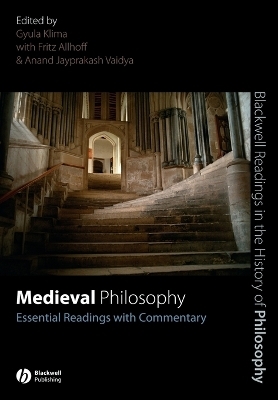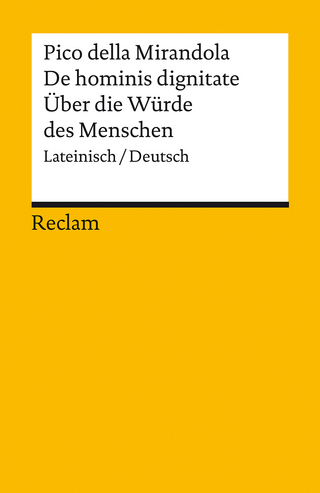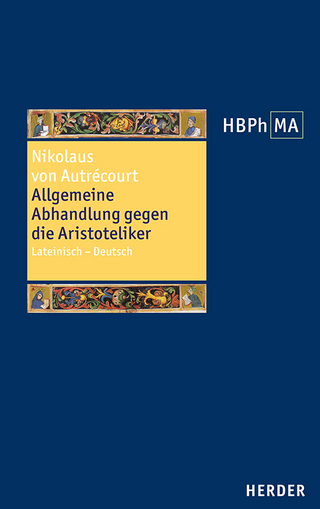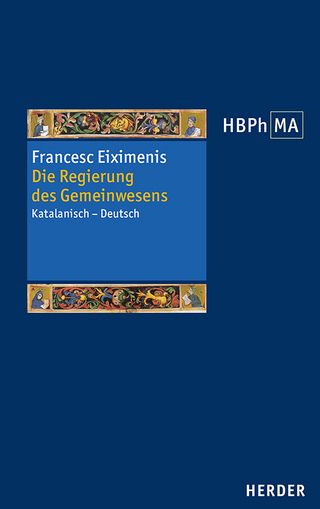
Medieval Philosophy
Wiley-Blackwell (Verlag)
978-1-4051-3565-8 (ISBN)
This collection of readings with extensive editorial commentary brings together key texts of the most influential philosophers of the medieval era to provide a comprehensive introduction for students of philosophy.
Features the writings of Augustine, Thomas Aquinas, Boethius, John Duns Scotus and other leading medieval thinkers
Features several new translations of key thinkers of the medieval era, including John Buridan and Averroes
Readings are accompanied by expert commentary from the editors, who are leading scholars in the field
Gyula Klima is a professor of philosophy at Fordham University. He acts as director of the international Society of Medieval Logic and Metaphysics and an executive council member of the American Catholic Philosophical Association since 2003. Klima is the author of ARS ARTIUM: Essays in Philosophical Semantics, Medieval and Modern (1988) and John Buridan: Summulae de Dialectica (2001). Fritz Allhoff is Assistant Professor of Philosophy at Western Michigan University. He has published work in journals including American Journal of Bioethics, History and Philosophy of the Life Sciences, International Journal of Applied Philosophy, and Kennedy Institute of Ethics Journal. Anand Jayprakash Vaidya is Assistant Professor of Philosophy at San José State University. His research is in Metaphysics & Epistemology, and Philosophy of Mind.
Contents
Text Sources and Credits viii
Acknowledgments xiii
General Introduction 1
Part I Logic and Epistemology 27
Introduction 27
Philosophy, Theology, Logic, and the Sciences 31
1 Augustine on Ancient Philosophy 31
2 Dialectica Monacensis (anonymous, twelfth century) on the Division of Science 43
3 Thomas Aquinas on the Nature and Scope of Sacred Doctrine 45
The Problem of Universals 59
4 Boethius Against Real Universals 59
5 John of Salisbury on the Controversy over Universals 63
6 The Summa Lamberti on the Properties of Terms 66
7 William Ockham on Universals 71
8 John Buridan on the Predicables 79
Illumination vs. Abstraction, and Scientific Knowledge 83
9 Augustine on Divine Ideas and Illumination 83
10 Thomas Aquinas on Illumination vs. Abstraction 87
11 Thomas Aquinas on our Knowledge of the First Principles of Demonstration 98
12 Henry of Ghent on Divine Illumination 103
13 Duns Scotus on Divine Illumination 110
Knowledge and Skepticism 117
14 Augustine on the Certainty of Self-Knowledge 117
15 Thomas Aquinas on whether the Intellect Can Be False 120
16 Henry of Ghent on whether a Human Being Can Know Anything 123
17 Nicholas of Autrecourt on Skepticism about Substance and Causality 134
18 John Buridan on Scientific Knowledge 143
Part II Philosophy Of Nature, Philosophy of The Soul, Metaphysics 151
Introduction 151
Hylomorphism, Causality, Natural Philosophy 157
19 Thomas Aquinas on the Principles of Nature 157
20 Thomas Aquinas on the Mixture of Elements 168
21 Giles of Rome on the Errors of the Philosophers 171
22 Selections from the Condemnation of 1277 180
23 John Buridan and the Impetus Theory of Projectile Motion 190
Human Nature and the Philosophy of the Soul 195
24 Augustine on the Soul 195
25 Averroës on the Immateriality of the Intellect 198
26 Siger of Brabant on the Intellective Soul 203
27 Thomas Aquinas on the Nature and Powers of the Human Soul 207
28 John Buridan on the Immateriality of the Soul 219
Metaphysics, Existence, and Essence 225
29 Avicenna on Common Nature 225
30 Thomas Aquinas on Being and Essence 227
31 John Buridan on Essence and Existence 250
God’s Existence and Essence 255
32 Augustine on Divine Immutability 255
33 Anselm of Canterbury on God’s Existence 259
34 Thomas Aquinas on God’s Existence and Simplicity 266
Part III Practical Philosophy 303
Introduction 303
Goodness and Being 309
35 Augustine on Evil as the Privation of Goodness 309
36 Augustine on the Origin of Moral Evil 311
37 Boethius on Being and Goodness 318
38 Thomas Aquinas on the Convertibility of Being and Goodness 322
Freedom of the Will 325
39 Augustine on the “Divided Will” 325
40 Boethius on Divine Providence and the Freedom of the Will 331
41 Anselm of Canterbury on Free Will 337
42 Henry of Ghent on the Primacy of the Will 349
Virtues and Happiness 353
43 Boethius of Dacia on the Supreme Good 353
44 Thomas Aquinas on Happiness 358
Divine Law, Natural Law, Positive Law 361
45 Thomas Aquinas on Natural Law and Positive Law 361
46 John Duns Scotus on Natural Law and Divine Law 375
Suggestions for Further Reading 382
Index 388
| Erscheint lt. Verlag | 12.6.2007 |
|---|---|
| Reihe/Serie | Blackwell Readings in the History of Philosophy |
| Verlagsort | Hoboken |
| Sprache | englisch |
| Maße | 173 x 246 mm |
| Gewicht | 708 g |
| Themenwelt | Geisteswissenschaften ► Philosophie ► Philosophie des Mittelalters |
| ISBN-10 | 1-4051-3565-4 / 1405135654 |
| ISBN-13 | 978-1-4051-3565-8 / 9781405135658 |
| Zustand | Neuware |
| Haben Sie eine Frage zum Produkt? |
aus dem Bereich


